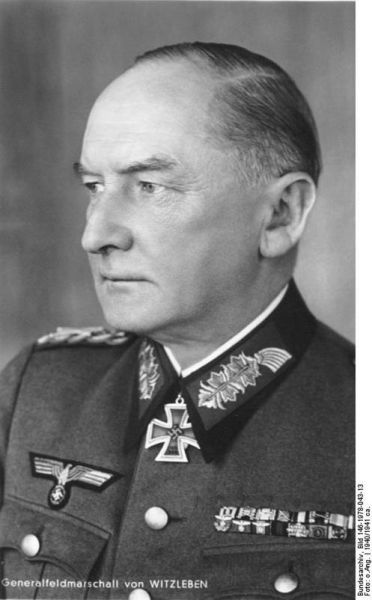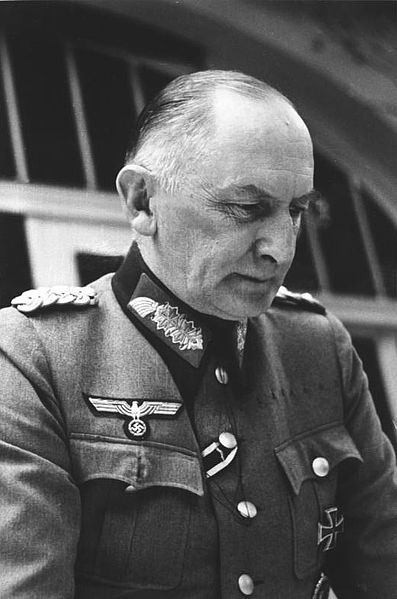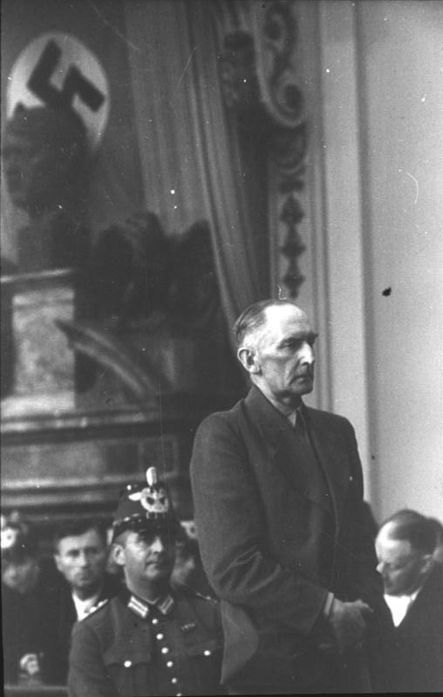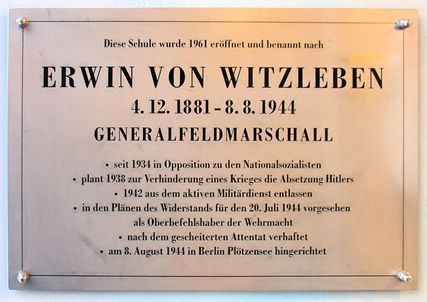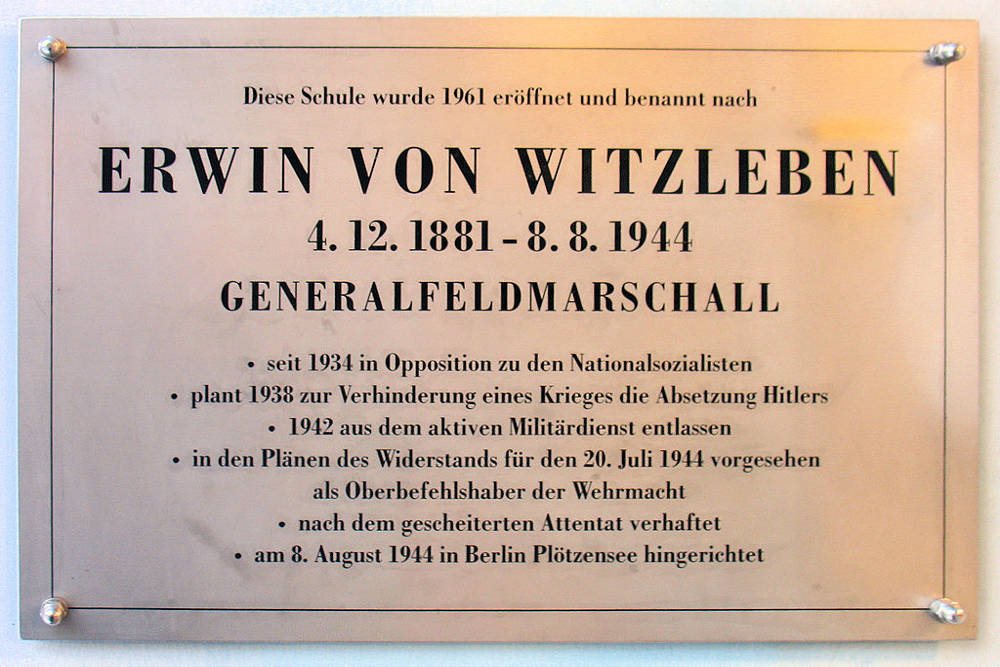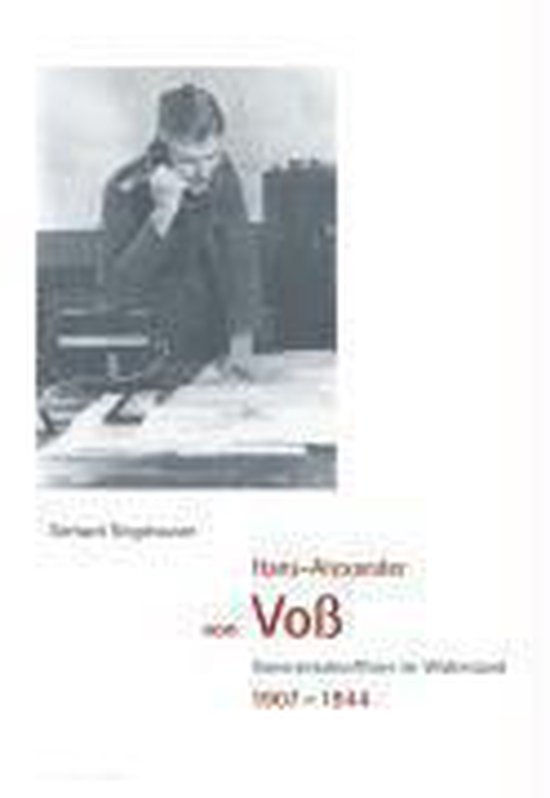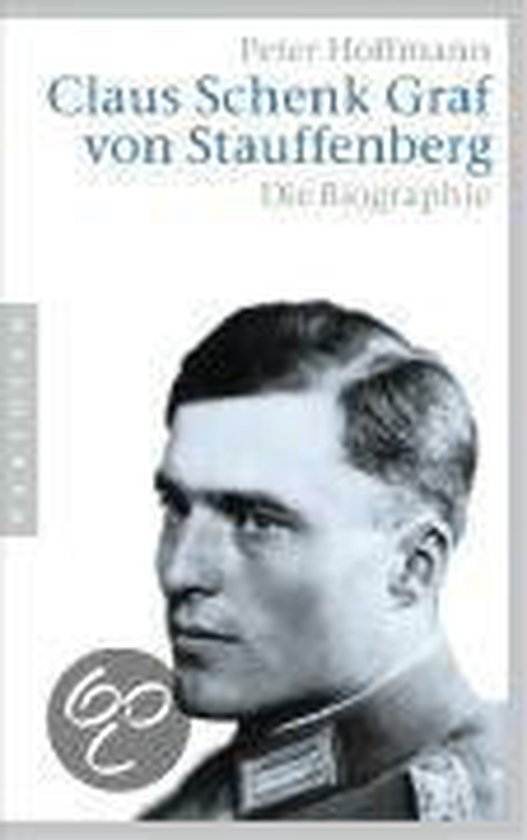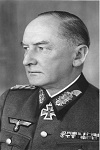Prior to World War One
Job Wilhelm Georg Erwin Erdmann von Witzleben was born December 4, 1881 in Breslau – at the time the capital of the Prussian province of Silesia, today Wroclaw in southwestern Poland – child of ancient Polish nobility. His father fought in the Franco-German war as Hauptmann in the Imperial army and following his discharge in 1876, he bought Ober-Poppschütz, a small estate in Upper-Silesia. Erwin von Witzleben spent his childhood years in Breslau and later on in Ober-Poppschütz. Here he was brought up by his father and his mother Theresa in strict religious fashion. It was a Prussian tradition to follow in one’s father’s footsteps so Erwin was predestined to join the army. On March 22, 1901 he was commissioned as an officer with average results. Von Witzleben subsequently started his career in the Grenadier regiment König Wilhelm I (2. West Preußisches) nr. 7 in Liegnitz. This was a regiment with a long term tradition regarding the King of Prussia so Erwin von Witzleben was allocated an important position in the army. He began as driver of 12. Kompanie and in later years served in other companies of the Regiment as well. Von Witzleben was promoted to Oberleutnant on June 26, 1910.
On May 21, 1907, Von Witzleben married Else Kleeberg and on May 8, 1908 their daughter Eva Maria Edelgarde Charlotte Amalie was born, A little later, July 3, 1909 the second child of the Von Witzleben couple was born, a son named Job Wilhelm Georg Richard Erwin.
World War One
When war broke out, Erwin was sent to the western front on August 11, 1914. He decided to keep a diary for his children for he assumed it would become a memorable event. On August 20, 1914, Von Witzleben crossed the border near Luxemburg in the rank of Adjutant of the 19. Reserve-Infanterie-Brigade. After his brigade had seen action in the first weeks, Von Witzleben was awarded the Eisernes Kreuz 2. Klasse (EK 2 or Iron Cross) on September 14, 1914. A month later, October 13, he was promoted to Hauptmann. Early November 1914, the 19. Reserve-Infanterie-Brigade was transferred to the Belgian sector of the front. There it participated in one of the many large offensives, each claiming many lives. Von Witzleben complained in his diary about the poor medical care and it made him sad so many lives were lost. The war raged on and Von Witzleben’s brigade was transferred again, this time to the region around Verdun.
Early February 1915, Von Witzleben was appointed commander of 2. Kompanie des Reserve-Infanterie-Regiments (IR) 6. His company was deployed in the region around Verdun in a location from where he could observe the enemy positions very well. There he ignored an order for the first time as he had been ordered to set up two forward positions in view of the enemy positions but he anticipated it would result in many casualties and therefore he refused to follow the order. Unfortunately he was forced to carry out the order a few days later and to his great relief, it all happened without casualties. On March 22, 1915, he was put in charge of another company in the same regiment, the 14. Kompanie.
A year later, on March 8, 1916 Von Witzleben and his company took part in the battle at Verdun where they were to capture a fortress. It failed because of the full moon which in combination with the snow betrayed the company positions. Nonetheless, Von Witzleben was awarded the EK 1 on March 11, 1916. Shortly after, on March 25, 1916, Von Witzleben was put in command of 6. Kompanie of the same regiment. He had been in function for hardly two weeks when he was injured in an artillery barrage. He had to recuperate and was sent on sick leave and from mid-August 1916 he held various commands within the 9. Reserve-Infanterie-Division. On May 2, 1917, he was posted to the front once more, this time as commander of II. Batallion der Reserve-Infanterie-Regimentes Nr 6. In that capacity he took part in the battle for Arras. On May 12, 1917, he was appointed Ritter des Hamburgisches Hanseatenkreuzes (Hamburg Hanze Cross) in recognition of his services.
On July 1917, Von Witzleben was given a new posting on the General Staff of the 4. Bayerische Infanterie-Division and was awarded the Königliche Preußische Hausorden Von Hohenzollern. Near the close of 1917, Von Witzleben took the General Staff course in Sedan as he wished to become an officer of the General Staff. At the end of December of that year he made the qualification for staff duty and waited for his first posting as officer of the General Staff. January 13, 1918 was the day and Von Witzleben could start as 4. Generalstabsoffizier des XI Armeekorps. He was awarded the Königliche Bayerische Militär-Verdienstorden (Bavarian Military Order of Merit) 4. Klasse mit Schwertern (with Swords). In this capacity he experienced the final massive offensive the German army leadership, Generalfeldmarschall Paul von Hindenburg and General der Infanterie Erich von Ludendorff, had launched hoping the defeat the western opponents. On April 21, 1918, he was authorized to wear the uniform of the Generalstab der Armee, making him a member of the Prussian Generalstab.
On August 2, 1918, Von Witzleben was promoted to Erster Generalstabsoffizier (Ia) in the 108. Jäger-Division. He took part in the battle of the Somme. Towards the end of the war (November 9, 1918) he was transferred to the 9. Infanterie-Division zur besonderen Verwendung (special tasks) and following the armistice, he was charged, (as Erster Generalstabsoffixzier) with overseeing the withdrawal of the 121. Infanterie-Division.
Definitielijst
- Batallion
- Part of a regiment composed of several companies. In theory a batallion consists of 500-1,000 men.
- Brigade
- Consisted mostly of two or more regiments. Could operate independently or as part of a division. Sometimes they were part of a corps instead of a division. In theory a brigade consisted of 5,000 to 7,000 men.
- Eisernes Kreuz
- Iron Cross. German military decoration.
- Iron Cross
- English translation of the German decoration Eisernes Kreuz.
- Jäger
- Also called fighter plane. Fighter planes can be used for air defence (armed with guns and/or carrying guided missiles) or for tactical purposes (armed with nuclear or conventional bombs or rockets). The aircraft used for tactical purposes are also called fighter- bombers because they are bombers with the speed and manoeuvrability of a fighter. Tactical fighters, equipped with photographic equipment are also used as reconnaissance plane.
- mid
- Military intelligence service.
- offensive
- Attack on a smaller or larger scale.
- regiment
- Part of a division. A division divided into a number of regiments. In the army traditionally the name of the major organised unit of one type of weapon.
Images
The period of the Weimar Republic
After the war, Von Witzleben was in doubt for a while whether or not he should continue his army career. Eventually, he decided to stay as he saw many leave and thought "not everyone can go". This clearly shows his devotion to duty. After the war he was given command of he Maschinengewehrkompanie (machine gun company) in the 8. Preußische Infanterie-Regiment. In December 1922, now a company commander, he was transferred to the staff of the 4. Division (Wehrkreiskommando IV). This was only formally his function because in reality he was a teacher at the Führergehilfsausbildung (training of assistant leaders), the cover up for officers to get a posting on the General Staff (the General Staff and the training for it had been banned by the Treaty of Versailles). April 1, 1923, saw Von Witzleben promoted to Major.
On February 1, 1926, he was transferred to Potsdam in order to take up the post of Erster Generalstabsoffizier im Stab des Infanterieführers III. On February 1, 1928 this was followed by his appointment as commander of the II. Hanseatische Batallion des 6. Infanterie-Regiments. In this period, the Major was promoted to Oberstleutnant. Only a little later, he was given a new function as Chef des Stabes der 6. Division und des Wehrkreises VI. Here he was promoted to Oberst on April 1, 1930 and his career took off. October 1, 1931 he was appointed commander of the 8. Preußische Infanterie-Regiment and two years later, shortly after Adolf Hitler (Bio Hitler) took power, he was named Infanterieführer VI, subordinate to the 6. Division, on October 1, 1933. In this function he was responsible for the training of three regiments and a battalion.
On February 1, 1934 Von Witzleben was promoted to Generalmajor and appointed commander of the 3. Division and commander-in-chief of Wehrkreis III. The same year he was promoted further to Generalleutnant. He got Erich von Manstein (Bio Von Manstein) as his chief of staff and when the so-called Arierparagraph was issued on February 28, Von Manstein and Von Witzleben protested jointly. The Arierparagraph meant that all military from Jewish descent were to be discharged and in their joint protest, Von Manstein and Von Witzleben sided with the Jewish military personnel. In their opinion, the Jews had put their lives on the line fighting for Germany during the First World War just like any other soldier and so they were to be treated accordingly. Reichswehrminister (Secretary of Defense) Werner von Blomberg, responsible for the measure took little notice of their protest and carried out the Arierparagraph anyway. On July 1, Von Witzleben’s function was renamed because of the expansion of the Wehrmacht. He was now commander of III. Armeekorps and commander of Wehrkreis III. As he had become corps commander, he was promoted to General der Infanterie on October 1, 1936.
During these years, Von Witzleben found increasing confirmation of his belief that Hitler’s policy would lead to something criminal, that is, war. He had read Mein Kampf and so he knew Hitler was up to more than just undo the Treaty of Versailles. During the 30s, that had been his major argument to speak out against Hitler more and more. Racial policy did play a role in his thinking but it was not his major reason.
In July 1938, Von Witzleben was informed by intelligence officer Hans Oster (Bio Oster) – who worked for the Abwehr headed by Admiral Wilhelm Canaris (Bio Canaris) – about Hitler’s plans to attack Czechoslovakia: Fall Grün. After this conversation, Von Witzleben asked Hjalmar Schacht, president of the Reichsbank, what the western powers would do in case a war would actually erupt. Schacht confirmed Von Witzleben’s fears: there was a very real danger of war breaking out if this plan of Hitler would actually be carried out. This was the moment Von Witzleben became active in the resistance. In the previous years he had come to know many persons who, like himself were critical of the Nazi regime. Detailed plans were drafted to stop Hitler before he occupied Czechoslovakia. The aim of these plans was to have the army occupy all agencies of the Nazis, to establish a military government and finally to hold new elections as soon as possible, protected by the army. After Hitler had been taken prisoner by the resistance, he would have to account for the crimes he had committed so far.
In the summer of 1938, a weird incident took place. Next to Von Witzleben’s residence was a casino of the SS. One afternoon, Von Witzleben and his wife were sitting on the terrace when a bullet scarcely missed him and ended up in the wall of his house. The bullet had gone straight through the chair Von Witzleben had been sitting in moments before. Although the SS played it down as just an incident and apologized for it, it did cause Von Wizleben to be more cautious with his talks about resisting Hitler.
The resistance group which had meanwhile been formed around Von Witzleben, the high ranking civil servant Hans-Bernd Gisevius and the intelligence officers Friedrich Wilhelm Heinz and Hans Oster, also put out feelers to foreign countries to be sure of the reaction of other countries in case of an attack on Czechoslovakia. The British Secretary of Foreign Affairs informed them Britain would surely intervene but suppressed the fact that at the time – early September 1938 – talks were already going on with the German government in order to prevent war. When on September 30, 1938 it was announced a treaty had been signed by France, Great Britain and Germany – the Munich Agreement – stipulating that the Sudetenland (a part of Czechoslovakia) would be annexed by Germany, the resistance group decided to abandon its plans. There would be no support from foreign countries and besides, Hitler had become immensely popular at home now.
On November 10, 1938, Von Witzleben was appointed commander-in-chief of Heeresgruppe 2 after General Wilhelm Adam had fallen into disgrace. With this appointment, the resistance group lost a strong military commander in Berlin. Although this appointment meant a step up in Von Witzleben’s career, the resistance group considered it a serious setback. Nonetheless, Schacht and Gisevius saw Von Witzleben as the most critical towards the Nazi regime of all generals. As commander of Heeresgruppe 2, Von Witzleben quickly saw that Hitler intended to unleash a war as he had frequently described the superiority of the Germanic race and the need for Lebensraum in the presence of his generals. In addition, a massive mobilization had already started.
On March 15, 1939 German troops marched into the Czech part of Czechoslovakia after the Slovaks had declared their independence and pledged their loyalty to Hitler. A week later, Lithuania returned the Memelland to Germany (one of the repartitioned areas Germany had lost as a result of the Treaty of Versailles). All this led to Great Britain and France issuing a declaration of guarantee to Poland: should Germany attack Poland, these two western powers would intervene. It worried Von Witzleben as he and his Heeresgruppe were responsible for the defense of the western border of Germany. He was convinced he was powerless against a possible invasion by France. In this period he was thinking about yet another possibility to stand up against Hitler and to that end, he made contact with Carl Goerdeler, former mayor of Leipzig and an active opponent of the Nazis. They agreed on Von Witzleben sending a few loyal division commanders to Berlin and that the workers movements should prevent an uprising from breaking out. These workers movements had quite a number of people in their ranks working outside the army, giving them a wide range in society. This offered them the influence they could use to prevent an uprising. Finally, a resistance group was to be established in each Wehrkreis. Von Witzleben and Goerdeler agreed on all this being ready the next year, 1940. Meanwhile they would keep in touch through Hans Oster.
In August 1939, Von Witzleben contacted Hans-Bernd Gisevius as he had not been informed about the actual political situation by the army leadership. Through BBC radio and Gisevius, Von Witzleben learned about Hitler’s plans for war and he and Gisevius agreed he would try to force, with violence if necessary, a chance of policy in Berlin with the help of the chief of staff of the OKH, Franz Halder and the commander-in-chief of the army, Walter von Brauchitsch (Bio Von Brauchitsch). Hitler however was one step ahead of the men and informed his generals about the non-aggression treaty with the Soviet Union that had meanwhile been signed and the plan to capture Poland. That was the moment the Wehrmacht was put on a war footing. Von Witzleben now became commander of 1. Armee, deployed in the west while Heeresgruppe 2 was renamed Heeresgruppe C commanded by Generaloberst Wilhelm Ritter von Leeb (Bio Von Leeb).
Definitielijst
- Abwehr
- Term used for the German military intelligence unit during the WW1 and WW2. From 1935 onwards under command of Admiral Wilhelm Canaris. The organisation often came into conflict with other secret services such as the SD and the Gestapo. During World War 2 under Canaris frequently a source for conspiracies against the Nazi regime until in 1943 a major conspiracy by a number of prominent members of the Abwehr was discovered and the Abwehr was placed under command of Himmler. After the assassination attempt on Hitler in 1944, Canaris was discharged and the Abwehr was dissolved. The conspirators and Canaris were prosecuted and in 1945 they were executed atc oncentration camp Flossenburg.
- Batallion
- Part of a regiment composed of several companies. In theory a batallion consists of 500-1,000 men.
- First World War
- Took place from 1914 till 1918 and is also named The Great War. The conflict started because of increased nationalism, militarism and neo-colonialism in Europe. Two alliances battled one another during the 4-year war, which after a dynamic start, resulted into static trench warfare. The belligerents were the Triple Alliance (consisting of Great-Britain, France, and Russia; later enlarged by Italy and the USA, amongst others) on the one hand and the Central Powers (consisting of Germany, Austria-Hungary, Bulgaria and the Ottoman empire) on the other hand. The war was characterized by the huge number of casualties and the use of many new weapons (flamethrowers, aircraft, poison gas, tanks). The war ended in 1918 when Germany and its allies surrendered unconditionally.
- Heeresgruppe
- The largest German ground formation and was directly subordinate to the OKH. Mainly consisting of a number of “Armeen” with few directly subordinate other units. A Heeresgruppe operated in a large area and could number several 100,000 men.
- invasion
- Armed incursion.
- Jews
- Middle Eastern people with own religion that lived in Palestine. They distinguished themselves by their strong monotheism and the strict observance of the Law and tradition. During World War 2 the Jewish people were ruthlessly persecuted and annihilated by the German Nazis. . An estimated 6,000,000 Jews were exterminated.
- Lebensraum
- “Living space”. Nazi term indicating the need for the overpopulated German lands to expand.
- machine gun
- Machine gun, an automatic heavy quick firearm.
- Mein Kampf
- “My Struggle”. Book written by Adolf Hitler, outlining the principles of National Socialism.
- Memelland
- Area in Lithuania that was annexed by the Germans in 1938.
- mobilization
- To make an army ready for war, actually the transition from a state of peace to a state of war. The Dutch army was mobilized on the 29 August 1939.
- Nazi
- Abbreviation of a national socialist.
- OKH
- “Oberkommando des Heeres”. German supreme command of the army.
- Regiment
- Part of a division. A division divided into a number of regiments. In the army traditionally the name of the major organised unit of one type of weapon.
- resistance
- Resistance against the enemy. Often also with armed resources.
- Soviet Union
- Soviet Russia, alternative name for the USSR.
- Wehrmacht
- German armed military forces, divided in ground forces, air force and navy.
Images
The beginning of World War Two
On September 1, 1939, the Wehrmacht invaded Poland but only the troops involved were informed about it beforehand. Von Witzleben only heard about the invasion after it had happened. Subsequently, Great Britain and France declared war on Germany on September 3, 1939. The commander of 1. Armee faced small skirmishes in the west from that moment on. Von Witzleben was promoted to Generaloberst on November 1 and he tried, by means of talks and assisted by his network, to convince the generals to resist. Hitler intended to attack western Europe as soon as possible and accelerated his plans accordingly. Few generals however were ready to rise up in earnest, most of them limited themselves to writing memoranda in which they voiced their opinion against an offensive.
On November 23, 1939, Hitler delivered a speech to his generals, clearly unvealing his plans for war. Von Witzleben was also present and noticed the generals were very much impressed by Hitler’s speech. All generals had had to swear an oath, pledging loyalty to Hitler. Von Witzleben had also taken this oath in 1935 but he considered this oath a promise to both sides. In addition, to the commander of 1. Armee, this was a promise to a function, not to a person and he thought that the well being of population and fatherland should have priority. In Von Witzleben’s opinion, Hitler was steering Germany into the abyss with his plans for war and therefore he was determined to oppose the man who tarnished the oath and Germany along with it.
At the end of 1939 and beginning of 1940, the resistance groups around Von Witzleben called for action. The groups wanted to have troops available in the vicinity of Berlin so they could contain security forces in Hitler’s capital. Next and in co-operation with Johannes Popitz (former Prussian secretary of finance), Carl Goerdeler, Hans Oster and Ulrich von Hassell (until 1938 ambassador in Italy) and others, a plan was drafted to make a new start with Germany after Hitler’s death. It was Von Witzleben’s task to familiarize Ludwug Beck with his predestined role as supreme commander of the army and to convince Franz Halder, Beck’s successor as chief of the general staff of the army, to co-operate with the plan but Halder turned out to be hesitant to make the required troops available. Thus this plan also failed.
On May 10, 1940, the order was issued to attack the Netherlands, Belgium, Luxemburg and France (Fall Gelb) after it had been postponed no less than 28 times. Von Witzleben’s troops were ordered to launch fake attacks in this first phase on limited targets in the Maginot line in order to tie down the troops. Von Witzleben launched the attack by 1. Armee on June 14 and his task was to force a breakthrough of the Maginot line in co-operation with 7. Armee. Just a day later, Von Witzleben and his army succeeded in penetrating the line and in the days following had surrounded it completely. On June 22, the encirclement was completed and Von Witzleben’s 1. Armee gained complete control over the area. Following the surrender of France on June 22, Von Witzleben was awarded the Ritterkreuz des Eisernen Kreuzes (Knight’s Cross of the Iron Cross) by Wilhelm von Leeb.
Headquarters of 1. Armee was moved to Nancy in France and on July 19, Von Witlzleben was appointed generalfeldmarschall by Hitler. Hitler used promotions as a way to regain loyalty from his generals. For instance a generalfeldmarschall was given an allowance which could rise to twice his yearly income. Addition, Hitler often made donations but it is common knowledge Von Witzleben did refuse those. It is not known whether his opinion of Hitler was influenced by the allowance he was given.
While in France, Von Witzleben was continuously kept informed about the preparations for a war against England by means of an amphibious operation. He considered this plan hopeless and saw it as bluff by Hitler. In addition, Von Witzleben’s staff was ordered to investigate whether an attack on Switzerland was expedient. He was informed about the outcome of this investigation but the generalfeldmarschall decided not to pass these results on to the OKH. Some argue that by doing so, he prevented an attack on Switzerland but this is subject to speculation.
Consolidation in western Europe
Following the victory over France, the Wehrmacht was restructured again and to Von Witzleben it meant he became supreme commander of Heeresgruppe D as of October 26, 1940. Von Witzleben was charged with maintaining order in France with these new forces. The quiet of peace gave Von Witzleben more time for his family and for hunting, something he also used during this time as a cover up for talks about resistance against Hitler. On January 31, 1941, Von Witzleben first learned about concrete plans to attack the Soviet Union in the spring. He felt sad about these plans and he realized many units would be transferred east. In the restructuring of the army, it became clear that Von Witzleben would become the new Oberbefehlshaber West (supreme commander), succeeding Gerd von Rundstedt (Bio Von Rundstedt) who had been transferred to the east but at the same time Von Witzleben retained his function as OB Heeresgruppe D. In western Europe, there were many supreme commanders with overlapping authorities as Hitler did not wish to concentrate military power too much. One of Von Witzleben’s major responsibilities was implementing defensive measures on the coast of France, Belgium and the Netherlands.
Unternehmen Barbarossa, the attack on the Soviet Union, was launched on June 22, 1941. Von Witzleben occupied himself with rallying dependable officers to rekindle the plans for resistance, apart from maintaining order in occupied western Europe. Along with General der Infanterie Alexander von Falkenhausen (Bio Von Falkenhausen), he was one of the few generals willing to co-operate with civil resistance. Von Witzleben went about his business very cautiously and talked about his critical attitude only in the presence of people he could trust. The plan for later that year entailed inviting Hitler to Paris and shooting him while receiving a parade. Subsequently, loyal troops would seize power in the west and occupy the centers of power in Berlin and in the east.
In January 1942, Von Witzleben dispatched Hans-Alexander von Voss, an officer on his staff, to the eastern front in order to win support for the resistance among the generals. Their support was essential to make the plan to murder Hitler in Paris succeed. In addition, Von Voss was to visit Halder to secure the support of the OKH but Halder rejected all support for resistance against Hitler as he was of the opinion that Hitler was the only person who could still save Germany. Von Witzleben and Von Voss were granted no time to develop their plans further because Von Witzleben was relieved from his function by Hitler on March 30, 1942 in the presence of Halder and transferred to the so-called Führerreserve, a group of high ranking officers for whom a function was temporarily unavailable. Reasons of health were used as official argument for this decision but it is far more likely, Von Witzleben was considered becoming too dangerous in his function and he was not deployed anymore, notwithstanding he reported back for duty again.
Definitielijst
- Heeresgruppe
- The largest German ground formation and was directly subordinate to the OKH. Mainly consisting of a number of “Armeen” with few directly subordinate other units. A Heeresgruppe operated in a large area and could number several 100,000 men.
- invasion
- Armed incursion.
- Iron Cross
- English translation of the German decoration Eisernes Kreuz.
- Maginot line
- French defence line along the French-German border.
- offensive
- Attack on a smaller or larger scale.
- OKH
- “Oberkommando des Heeres”. German supreme command of the army.
- resistance
- Resistance against the enemy. Often also with armed resources.
- Soviet Union
- Soviet Russia, alternative name for the USSR.
- Wehrmacht
- German armed military forces, divided in ground forces, air force and navy.
Images
Sidetracked and contacts with the resistance
Throughout his career, Von Witzleben suffered from stomach ulcers and various health problems. During the war he underwent surgery of his stomach and on various occasions he fell seriously ill when occupied with the plans to stop Hitler. Early 1942 he underwent treatment for a stomach operation. At the same time his wife was terminally ill and she died of cancer on March 15, 1942. Von Witzleben spent the last weeks with his wife and with her demise he lost an important confidant regarding his critical role towards the regime.
Von Witzleben had been stripped of his command and so he could only resist Hitler as an individual person, making use of his connections. Something more serious for the resistance group with Goerdeler, Generalmajor Henning von Tresckov (Bio Von Tresckov), Oster and others) was they had lost the connections that were possibly be able to provide troops that could be deployed in an act of resistance. Von Witzleben decided to move to Berlin in order to further develop his plans for the resistance group as close to the center of power as possible. In July 1942, he even rejected an offer to become supreme commander of 12. Armee und Südost as he wanted to concentrate on the activities of the opposition.
In 1943 a number of assassination attempts were being prepared at the eastern front by a resistance group around Henning von Tresckov behind Von Witzleben’s back. Generaloberst Ludwig Beck emerged as leader of this group and he was to become the new temporary leader of Germany after an attempt had succeeded. Erwin von Witzleben was destined to take command of the entire Wehrmacht, subordinate to Beck. He was given this role because of the respect he enjoyed among the troops but he was not too deeply involved in the preparations for these attempts. He was continuously kept informed by Hans Oster though. Von Witzleben’s main tasks were to convince generals to join the resistance like for instance Generaloberst Friedrich Fromm, commander of the Ersatzheer (reserve army).
Mid-1943 Von Witzleben was admitted to hospital with an internal bleeding and he had to take time to recuperate. As soon as he was fit again in September the same year, he began drafting the orders he would issue as commander of the Wehrmacht after the attempt on Hitler had succeeded. One of those was to enter into negotiations with General Dwight Eisenhower (Bio Eisenhower) regarding an armistice. Another one obliged all military commanders to obey his orders and a third to liberate all concentration camps. The attempt on Hitler now had to be carried out with a bomb and was being prepared by Oberst Claus Schenk Graf von Stauffenberg (Bio Von Stauffenberg), in co-operation with Henning van Tresckov and some others. Meanwhile the situation to carry out the attempt deteriorated seriously as Hitler allowed less and less people around him and moreover, Allied troops had landed in Normandy on June 6, 1944. This meant military units were also tied down at the front and so could not be used in a possible attempt. In addition, the objective of the attempt, stopping the Hitler government and establishing a provisional government lost its base. The invasion was Germany’s third front and it would only be a matter of time before Germany would be defeated. The resistance group carried on nonetheless as they considered their signal more important than attaining the objectives of the attempt.
On July 13, Von Witzleben brought his family to safety by taking them to central Germany as the attempt could be made at any moment. Von Stauffenberg, as chief of staff of the commander of the Ersatzheer had an entry to Hitler and so had the best opportunity to kill Hitler. On the day of the attempt, Von Witzleben was in Berlin and when the code word Walküre was issued, Von Witzleben knew it was time to issue his orders to all Wehrmacht commanders. The chief of the OKW, Generalfeldmarschall Wilhelm Keitel issued his own orders though, countermanding those of Von Witzleben. A growing number of troops no longer took the military men of the resistance seriously because of Keitel’s action. The attempt and coup proved to be a failure, Hitler survived and the plans for seizing power by the resistance group evaporated.
Von Witzleben was quickly convinced the situation for the resistance group had become hopeless. Various prerequisites had not been met, such as occupying the center of power, killing Hitler and taking over radio traffic. On July 20, having paid a lightning visit to the center of the resistance, Von Witzleben returned to his family where he made a dejected impression.
Motivation and death
There were different reasons for Von Witzleben to resist Hitler. One of the main reasons was his profound faith which was diametrically opposite to Hitler’s attitude regarding Christianity. Moreover, as early as 1939, Von Witzleben knew about the crimes against humanity in Poland which he abhorred. His most important reason possibly was that he wanted to keep the peace based on his own experiences during World War One. These reasons caused him to resist against the regime from 1939 onwards, up to the last moment when Von Stauffenberg failed in his attempt.On July 21, 1944, Von Witzleben was arrested and taken to the notorious Gestapo prison at the Prinz Albrechtstraße in Berlin. After a few examinations, the generalfeldmarschall decided to confess his role in the resistance group but without naming any more names. He was tortured and dishonorably discharged from the Wehrmacht. This was a move by Hitler to have Von Witzleben tried by a civilian court, the Volksgerichtshof instead of a court martial which was the usual procedure for military personnel. Hitler was afraid the Reichskriegsgericht would sentence Von Witzleben too lightly and Hitler wanted to ensure the maximum penalty.
The trial before the Volksgerichtshof was a farce and the defendants had to be made ridiculous. Von Witzleben was wearing clothes far too large and in addition Nazi judge Roland Freisler only yelled at the defendants, degrading and humiliating them as much as possible. The verdict was a foregone conclusion: death by hanging. During the trial Von Witzleben confessed his participation and his responsibility for the order to liberate the concentration camps. The next day, Von Witzleben requested to be executed by a firing squad but Hitler had already ordered all defendants to be hanged like traitors, strung up like cattle from meat hooks. Von Witzleben heard his sentence and told Freisler: "You can give us the hangman now but within three months the people, indignant and tormented will take you to court and will drag you through the rubble of the streets alive." That same night, Generalfeldmarschall Erwin von Witzleben was hanged in Berlin-Plötzensee; all executions were recorded on film as ordered by Hitler. After the war, his family fought hard to have his sentence annulled and have him rehabilitated. On May 31, 1946, his sentence was revoked so he was no longer earmarked as a traitor to his country. Freisler was killed during a bombing attack on Berlin on February 3, 1945.
Definitielijst
- crimes against humanity
- Term that was introduced during the Nuremburg Trials. Crimes against humanity are inhuman treatment against civilian population and persecution on the basis of race or political or religious beliefs.
- invasion
- Armed incursion.
- Mid
- Military intelligence service.
- Nazi
- Abbreviation of a national socialist.
- OKW
- “Oberkommando der Wehrmacht”. German supreme command of the Armed Forces, Army, Air Force and Navy.
- resistance
- Resistance against the enemy. Often also with armed resources.
- Wehrmacht
- German armed military forces, divided in ground forces, air force and navy.
Images
Information
- Article by:
- Matthias Ouwejan
- Translated by:
- Arnold Palthe
- Published on:
- 19-01-2025
- Feedback?
- Send it!
Related sights
Related books
Sources
- BASSETT, R., Hitler's spy chief, the Wilhelm Canaris mystery, Pegasus Books, London, 2012.
- GRABNER, S. e.a., Henning von Tresckow. Ich bin der ich war, Lukas Verlag, Berlijn, 2001.
- HASSELL, U. VON e.a., Die Hassell Tagebücher 1938-1944, Goldmann Verlag, München, 1994.
- HOFFMANN, P., Claus Schenk Graf von Stauffenberg, Pantheon, München, 2007.
- MüLLER, K.J., Generaloberst Ludwig Beck, Ferdinand Schöningh Verlag, Paderborn, 2008.
- RINGSHAUSEN, G., Hans-Alexander von Voss, generalstabsoffizier im Widerstand, 1907-1944, Lukas Verlag, Berlin, 2008.
- SCHEURIG, B., Henning von Tresckow. Eine Preusse gegen Hitler, Ullstein Buchverlage, Berlijn, 2004.
- STAHLBERG, A., Die verdammte Pflicht, Ullstein Verlag, Berlin, 1990.
- WITZLEBEN, G. VON, Wenn es gegen den Satan Hitler geht..., Osburg Verlag, Hamburg, 2013.
